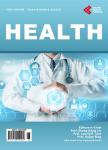Effects of intervention measures on irrational antibiotics/antibacterial drug use in developing countries: A systematic review
Effects of intervention measures on irrational antibiotics/antibacterial drug use in developing countries: A systematic review作者机构:Department of Pharmacology and Therapeutics Makerere University College of Health Sciences Kampala Uganda Department of Primary Care and Population Sciences University of London London UK Kampala International University Medical School Ishaka Campus Ishaka Uganda
出 版 物:《Health》 (健康(英文))
年 卷 期:2014年第6卷第2期
页 面:171-187页
学科分类:1002[医学-临床医学] 100214[医学-肿瘤学] 10[医学]
主 题:Antibiotic/Antibacterial Drugs Interventions Misuse Systematic Review Developing Countries
摘 要:Irrational antibiotics/antibacterial (AB) drug use is a global problem, especially in developing countries. This results in an increased emergence of resistance to most common bacteria, higher cost of treatment, prolonged hospitalization and adverse drug reactions. Interventions measures have been instituted to avert the problem but it still persists. A systematic review was conducted to determine the effect of different interventions (education, managerial, diagnostic tests, regulatory, economic and multifaceted) on misuse of AB drugs in developing countries. A total of 722 articles were retrieved and 55 were reviewed. About 10.9% of the studies were from Africa, 63.6% from Asia, 9.1% from Latin America, and 16.4% from Southeastern Europe. A total of 52.7% of the studies were from hospital settings, 5.5% from outpatient departments, 21.8% were from public health care facilities, 12.7% from private pharmacies/drug stores, and 7.3% from the communities. Education intervention had 27.3% studies, managerial had 20%, managerial/education had 3.6%, regulatory had 9.1%, education/regulation had 9.1% and diagnostic had 3.6% studies. Multifaceted intervention had 27.3% studies, with 63% improvement in appropriate AB doses prescribed, 2.6% mean number of AB encounter reduction, 23% AB prescription reduction, 18.3% generic AB prescription improvement, 32.1% reduction in AB use, 89% reduction in AB use in acute respiratory infection, 82% in surgery, 62.7% mean reduction in deliveries, 39% in STDs, 36.3% mean reduction in diarrhea, 14.6% mean reduction AB use in malaria, and 6%-11% in the cost of treating bacteria-resistant organisms. Also noted was 6.3% reductions in mean AB encounters after 1 month of intervention, and then increased to 7.7% after 3 months thus lacking sustainability. Multifaceted interventions were effective in reducing irrational AB drug use in the various health facilities and communities as well as reduction in the emergence of resistance to the commonest



